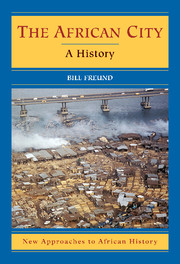Book contents
- Frontmatter
- Contents
- PREFACE
- 1 Urban Life Emerges in Africa
- 2 African Cities and the Emergence of a World Trading Economy
- 3 Colonialism and Urbanisation
- 4 Cities in Revolt: The Long-Term Crisis of South African Urbanism
- 5 The Post-Colonial African City
- 6 Globalisation and the African City: Touba, Abidjan, Durban
- INDEX
4 - Cities in Revolt: The Long-Term Crisis of South African Urbanism
Published online by Cambridge University Press: 05 June 2012
- Frontmatter
- Contents
- PREFACE
- 1 Urban Life Emerges in Africa
- 2 African Cities and the Emergence of a World Trading Economy
- 3 Colonialism and Urbanisation
- 4 Cities in Revolt: The Long-Term Crisis of South African Urbanism
- 5 The Post-Colonial African City
- 6 Globalisation and the African City: Touba, Abidjan, Durban
- INDEX
Summary
In many respects, the history of the South African city resembles that of cities elsewhere in Africa. In particular, the urban policies of the colonial era, for which South Africa was often a model, show continuities and similarities to a large extent. This is true particularly with regard to cities such as Lusaka, Harare, Nairobi, and the string of Copperbelt towns which were created out of nothing (or on the completely effaced sites of earlier settlements). To an extent, of course, the scale and antiquity of immigrant establishment on South African soil is such that the cities which European settlers founded are larger and, in particular, more institutionally and spatially complex than what one might find elsewhere. The “white” town with its recreational and cultural amenities, its official structures and its historic peculiarities, typically covered most urban space and seemed to define urban life. Moreover, the distinctive presence of a Coloured (most easily defined as mixed race) population, culturally moulded in the colonial era, and a large population descended from Indian immigrants, is also on a very significant scale. If the whole urban space is now entirely integrated, the presence of more than nine million “non-blacks” of various shades at the start of the twenty-first century remains important and even, in many respects, a still-dominant feature of civil society.
While the “white” city will remain relevant to this chapter, it will not receive so much direct attention.
- Type
- Chapter
- Information
- The African CityA History, pp. 107 - 141Publisher: Cambridge University PressPrint publication year: 2007



